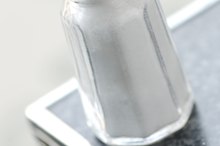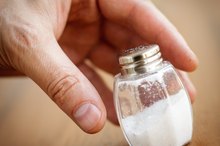Salt & Anxiety
Salt often gets a bad rap when it comes to health and diet. Most people think of salt as the enemy, due to numerous reports that indicate the health dangers of high sodium. Although clinical studies have had mixed results, recent research has shown that adding a bit of salt to your diet may have benefits for anxiety and stress.
Importance of Salt
Salt is essential for maintaining good health. Table salt is the most common type of salt, although sodium occurs naturally in foods including milk, beets and celery. Processed meats contain high amounts of added sodium for preservation and flavor. According to University of Tennessee Medical Center, sodium is necessary for regulating blood pressure and blood volume and also plays a role in nerve and muscle function. The average adult should aim for no more than 2,300 milligrams of dietary sodium daily, though many Americans exceed this limit on a daily basis.
- Salt is essential for maintaining good health.
- Table salt is the most common type of salt, although sodium occurs naturally in foods including milk, beets and celery.
About Anxiety
Salt Sensitivity Symptoms
Learn More
Anxiety is a normal response to fear, stress and tension. If you continue to experience symptoms of anxiety when no stressor is present, you may have an anxiety disorder. Symptoms include feelings of fear or panic, increased anxiety for no apparent reason, irritability, insomnia, appetite changes, excessive worry and heightened levels of stress. According to the Anxiety Disorders Association of America, anxiety disorders are the most common mental health problem in the United States. While the causes aren't totally understood, researchers think they occur due to a combination of genetic, biological and social influences. Dietary factors may also play an important role in the development of anxiety disorders.
- Anxiety is a normal response to fear, stress and tension.
- If you continue to experience symptoms of anxiety when no stressor is present, you may have an anxiety disorder.
Salt and Anxiety
You might think too much sodium would lead to anxiety; however, reports about sodium's effects on anxiety have been mixed. Different forms of sodium appear to have different effects on anxiety. One interesting study, published in the April 2011 issue of "Journal of Neuroscience," showed that increased levels of sodium chloride led to a blunted stress response in laboratory rats. Researchers from the University of Cincinnati dehydrated rats by giving them sodium chloride. The rats were then exposed to a stress test. In comparison to a control group, these rats secreted lower amounts of stress hormones and also experienced a lowered cardiovascular response and lower blood pressure. Further studies need to be conducted to evaluate these effects on humans. Older studies have yielded conflicting results. One study, published in 1971 in the "British Journal of Psychiatry," showed that sodium lactate, a form of sodium produced from lactic acid, can induce anxiety and panic attacks. However, a study published in the November 1998 issue of the journal "Biological Psychiatry," showed that both sodium lactate and sodium chloride led to increased incidences of panic in study participants.
- You might think too much sodium would lead to anxiety; however, reports about sodium's effects on anxiety have been mixed.
- However, a study published in the November 1998 issue of the journal "Biological Psychiatry," showed that both sodium lactate and sodium chloride led to increased incidences of panic in study participants.
Considerations
Low Sodium Levels & Agitation
Learn More
Research studies regarding effects of salt on anxiety and anxiety disorders are mixed; further research is needed to fully evaluate the effects of various forms of sodium on anxiety and anxiety disorders. Consult your doctor if you are concerned about your sodium intake, and don't consume more salt without consulting your physician -- it can cause harmful side effects, including increased blood pressure. If you suspect that you have an anxiety disorder, do not attempt to self-diagnose your condition. Talk to your doctor or a qualified mental health professional to discuss possible treatment options.
- Research studies regarding effects of salt on anxiety and anxiety disorders are mixed; further research is needed to fully evaluate the effects of various forms of sodium on anxiety and anxiety disorders.
- Consult your doctor if you are concerned about your sodium intake, and don't consume more salt without consulting your physician -- it can cause harmful side effects, including increased blood pressure.
Related Articles
References
- Journal of Neuroscience: Elevated Levels of Sodium Blunt Stress Response
- British Journal of Psychiatry: Anxiety and the Effects of Sodium Lactate...
- Biological Psychiatry: Sodium Lactate and Hypertonic Sodium Chloride Induce Equivalent Panic Incidence...
- Anxiety Disorders Association of America: Facts & Statistics
- American Heart Association. Sources of Sodium.
- Centers for Disease Control and Prevention. Top 10 Sources of Sodium. 2017.
- Institute of Medicine. Dietary Reference Intakes Tables and Application. National Academies of Sciences, Engineering, and Medicine, Health and Medicine Division. 2015.
- United States Department of Agriculture. Dietary Guidelines for Americans 2015–2020. United States Department of Health and Human Services. 2015.
Writer Bio
Ashley Miller is a licensed social worker, psychotherapist, certified Reiki practitioner, yoga enthusiast and aromatherapist. She has also worked as an employee assistance program counselor and a substance-abuse professional. Miller holds a Master of Social Work and has extensive training in mental health diagnosis, as well as child and adolescent psychotherapy. She also has a bachelor's degree in music.








